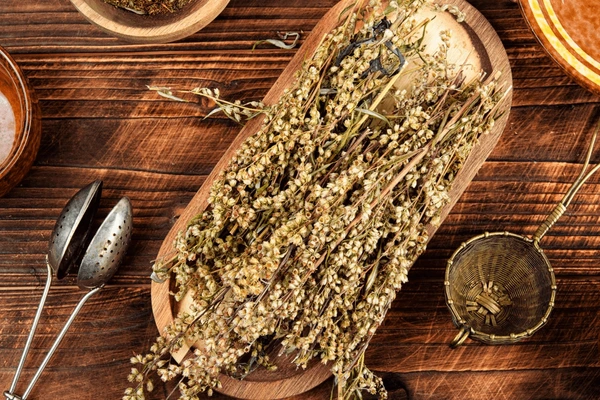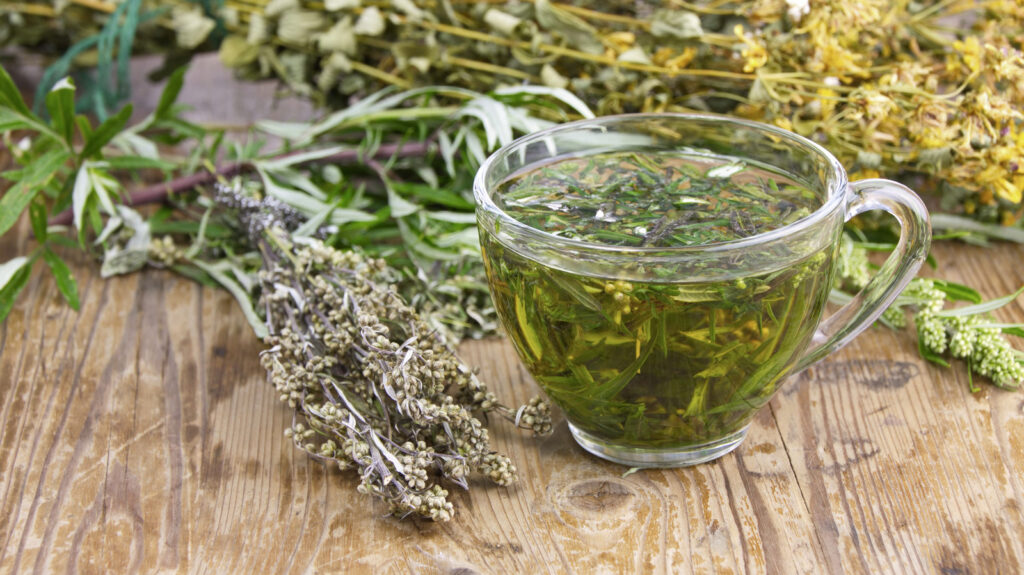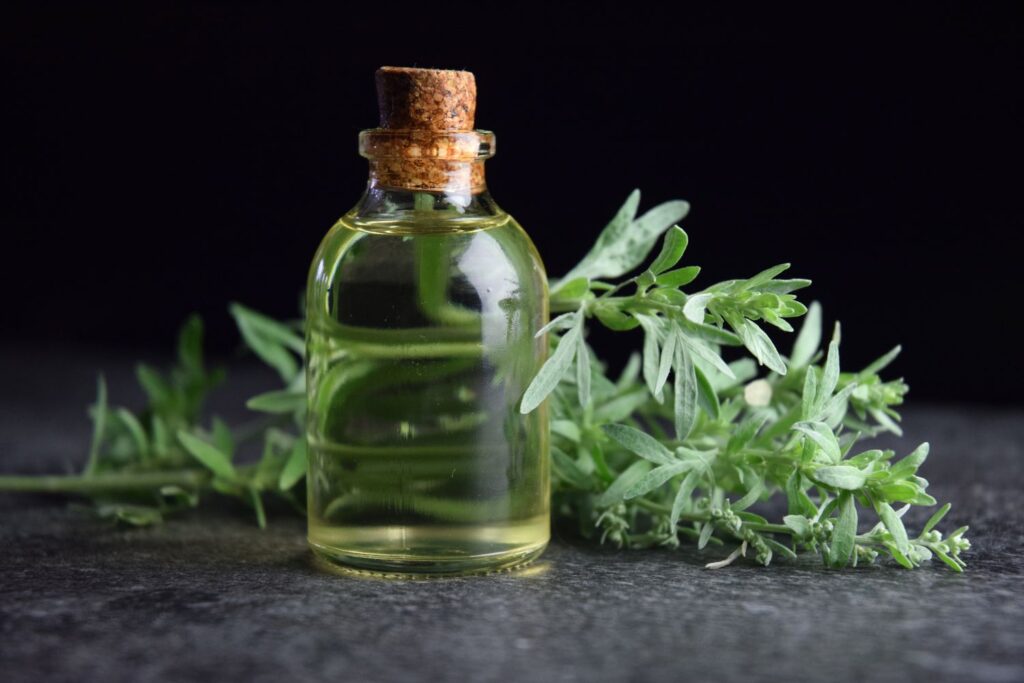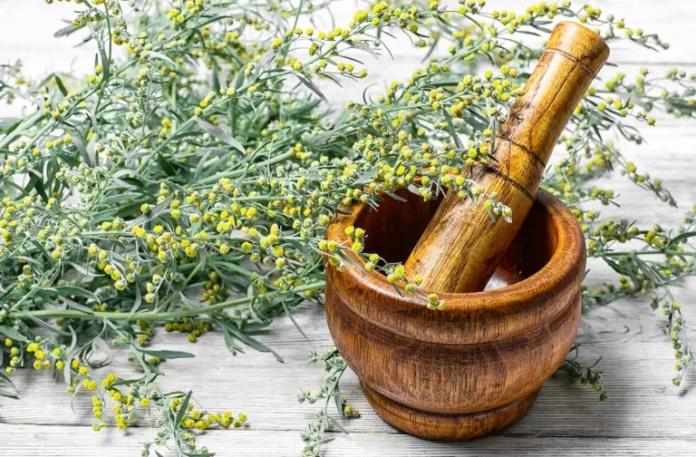INTRODUCTION
Wormwood (Artemisia absinthium), a perennial herb belonging to the family Asteraceae, is well known for its strong aroma and intensely bitter taste. Native to Europe and parts of Asia, it is now widely distributed in many temperate regions of the world. The plant bears silvery-green leaves and small yellowish flowers, producing a distinctive fragrance due to its essential oils. Traditionally, wormwood has been valued for its medicinal properties, particularly as a digestive stimulant and a remedy for intestinal worms, which is how it derived its common name. Its main active constituents include thujone, absinthin, and various flavonoids that contribute to its therapeutic effects.

English: Wormwood
Hindi: अफ़सीन, अफ़सिंथ (Afsin, Afsinth)
Sanskrit: तिक्तमूल (Tiktamula), नागदौना (Nagdauna)
Arabic: شيح (Sheeh / Shih)
Urdu: افسعطین رومی (Afsanteen)
Persian (Farsi): افسنطین (Afsanteen)
Chinese (Mandarin): 苦艾 (Kǔ ài)
Japanese: ニガヨモギ (Nigayomogi)
French: Absinthe
German: Wermut
Spanish: Ajenjo
Italian: Assenzio
Russian: Полынь горькая (Polyn gorkaya)
Greek: Αψίνθιον (Apsinthion)
Turkish: Pelin otu
Nepali: तिते पाती (Tite Paati)
HEALTH BENEFITS:

Stimulates digestion:
As a powerful bitter, dried wormwood can help stimulate the production of saliva, stomach acid, and bile, improving overall digestive function and promoting better nutrient absorption.
Relieves digestive issues:
It is traditionally used to address indigestion, bloating, gas, and intestinal spasms.
Supports appetite:
For those with a poor appetite, the bitter compounds can help stimulate hunger.
Aids liver and gallbladder:
It may support liver and gallbladder health by stimulating bile production.
Fights parasites:
Historically, wormwood has been used as a vermifuge to expel intestinal parasites such as roundworms and pinworms. While human evidence is limited, animal and test-tube studies show it may be effective.
Antifungal and antibacterial:
Compounds in wormwood essential oil, such as thujone and other constituents, have shown antifungal and antibacterial activity against a range of microorganisms.
Crohn’s disease:
One double-blind study found that patients with Crohn’s disease who took a wormwood supplement had fewer symptoms and were able to reduce their need for steroids. This is an area that requires more research.
Pain relief:
Dried wormwood contains compounds that may help reduce pain and inflammation.
Neuroprotective properties:
Some animal studies suggest wormwood may have a brain-protective effect and potentially act as an antidepressant.
Blood sugar balance:
Limited animal research indicates that wormwood may help balance blood sugar and improve insulin sensitivity.
Antioxidant effects:
Wormwood contains antioxidants like flavonoids that can help fight oxidative stress in the body.
SIDE EFFECTS(high doses):

Neurological damage:
The thujone in wormwood oil excites the central nervous system by blocking GABA receptors, which can cause severe side effects such as seizures, convulsions, tremors, delirium, and hallucinations.
Kidney failure:
Taking wormwood oil, particularly in excessive amounts, has been linked to kidney failure.
Muscle breakdown (rhabdomyolysis):
This serious condition, where damaged muscle tissue releases proteins and electrolytes into the blood, has been reported with high-dose ingestion.
Psychosis:
Historically, long-term consumption of absinthe, an alcoholic drink made with wormwood, was linked to a syndrome called “absinthism,” characterized by mental and toxic disorders.
Pregnancy and breastfeeding:
Thujone can affect the uterus and potentially endanger a pregnancy. There is not enough safety information regarding breastfeeding.
HOW TO USE:
1. As a Herbal Tea (Infusion)

Method:
Add ½ to 1 teaspoon of dried wormwood leaves to one cup of hot water.
Steep for 5–10 minutes, then strain.
Dosage:
Drink once or twice daily before meals to stimulate digestion.
Note:
The tea is very bitter, so it can be mixed with other herbs like peppermint or anise to improve taste.
2. As a Tincture
Method:
Wormwood tinctures are made by soaking the herb in alcohol (usually 1:5 ratio).
Dosage:
Take 10–20 drops, diluted in water, 1–2 times a day before meals.
Use:
Helps improve appetite and relieve indigestion.
3. As a Powder or Capsule
Method:
The dried leaves are ground and filled into capsules or used as powder.
Dosage:
About 300–500 mg, once or twice daily (under supervision).
Use:
Common in Unani and Ayurvedic preparations for digestive and antiparasitic effects.
4. As an External Application

Use:
Wormwood oil or poultices may be applied externally to relieve muscle pain or joint inflammation.
Caution:
Essential oil should never be applied undiluted—always mix with a carrier oil (like coconut or olive oil).
5. In Bitters and Tonics
Used in very small amounts in herbal bitters or vermouth to stimulate digestion and appetite.
These preparations are taken in drops or teaspoons, not as beverages.
Precautions
Do not use during pregnancy or breastfeeding.
Avoid prolonged or high-dose use — thujone in wormwood can be toxic to the nervous system.
People with epilepsy, liver disease, or kidney disorders should avoid it.
Always consult a qualified herbalist or healthcare professional before internal use.




